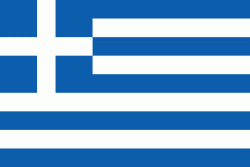Spata (Spáta)
Spata is situated in the middle of the Mesogeia plain, east of Mount Hymettus and west of the Aegean Sea coast. Athens International Airport ("Eleftherios Venizelos") covers the eastern portion of Spata. It is located southeast of Pallini, southwest of Rafina, west of Artemida and about 22 km east south east of Athens city center.
The town proper is made up of residential neighborhoods. Farmland, mostly vineyards and olive groves, lie around. Retsina wine was the traditional cash crop of the whole area, complemented with olives and olive oil, figs, almonds, pistachios, and wheat. Nowadays viticulture is dwindling as a mass occupation, albeit supplanted by the emergence of many modern wineries that mostly specialize in vinifying the local Savatiano grape. The bulk of the grape and wine business is handled by the local co-operative. In 1995, the southern portion was committed to construction of the new Athens International Airport, which was completed in March 2001. The Attica Zoological Park, or "Attica Zoo", opened in May 2001 and is Athens' and Greece's largest zoo.
Spata has five kindergartens, three elementary schools, two secondary schools, a police station, Post Office, several bank offices, and a junior football/soccer team, Aittitos (Invincible). The training facilities of AEK FC are also located there.
The municipal unit of Spáta also incorporates various small exurbs: Agía Kyriakí (pop. 886 in 2011), Neápoli (584), Ágios Ioánnis (284), Velanidiá (257), Christoúpolis (518), Foínikas (113), Étos Stéko (87), Ágios Nikólaos Boúra (195), and Ímeros Péfkos (211).
Map - Spata (Spáta)
Map
Country - Greece
 |
 |
| Flag of Greece | |
Greece is considered the cradle of Western civilization, being the birthplace of democracy, Western philosophy, Western literature, historiography, political science, major scientific and mathematical principles, theatre and the Olympic Games. From the eighth century BC, the Greeks were organised into various independent city-states, known as poleis (singular polis), which spanned the Mediterranean and the Black Sea. Philip II of Macedon united most of present-day Greece in the fourth century BC, with his son Alexander the Great rapidly conquering much of the ancient world, from the eastern Mediterranean to the North Western parts of India. The subsequent Hellenistic period saw the height of Greek culture and influence in antiquity. Greece was annexed by Rome in the second century BC, becoming an integral part of the Roman Empire and its continuation, the Byzantine Empire, which was culturally and linguistically predominantly Greek.
Currency / Language
| ISO | Currency | Symbol | Significant figures |
|---|---|---|---|
| EUR | Euro | € | 2 |
| ISO | Language |
|---|---|
| EN | English language |
| FR | French language |
| EL | Greek language |















